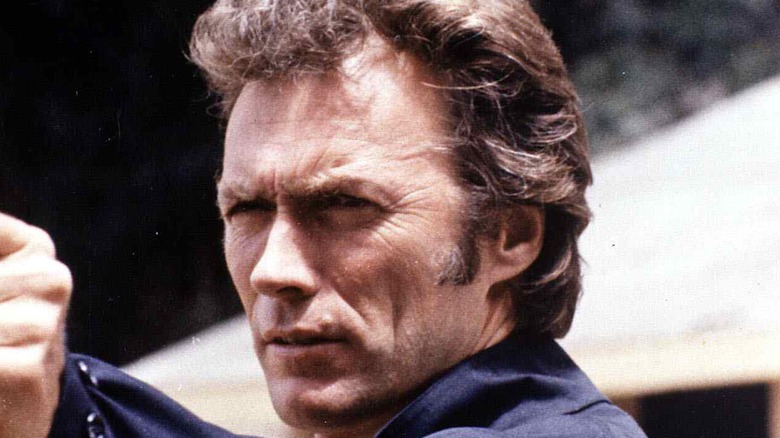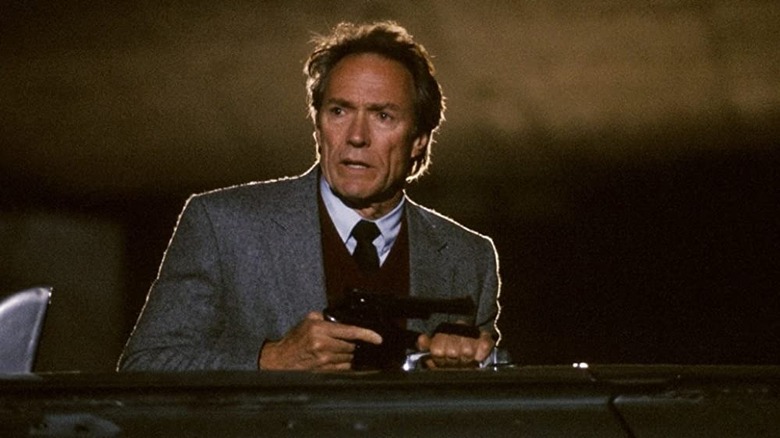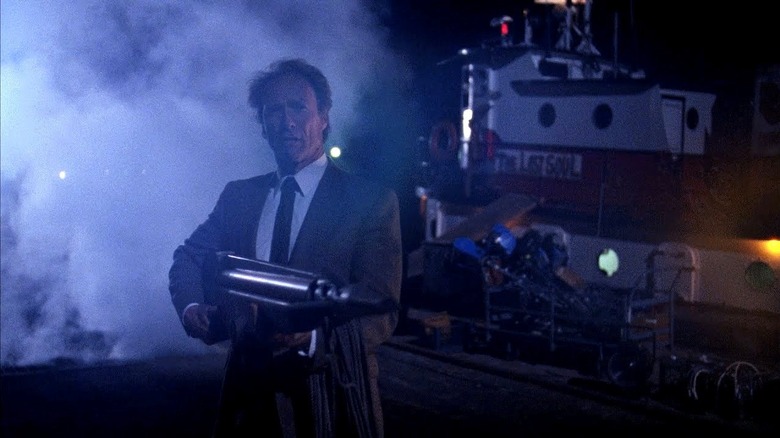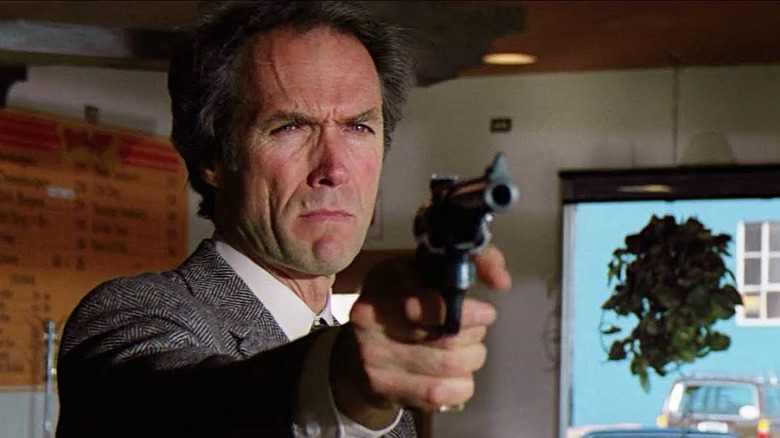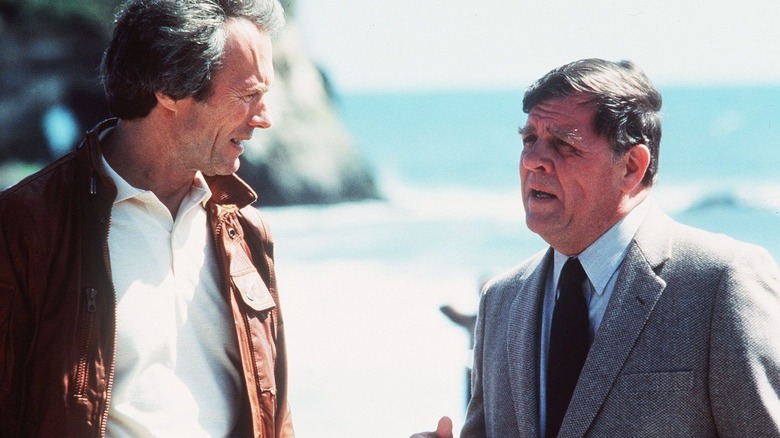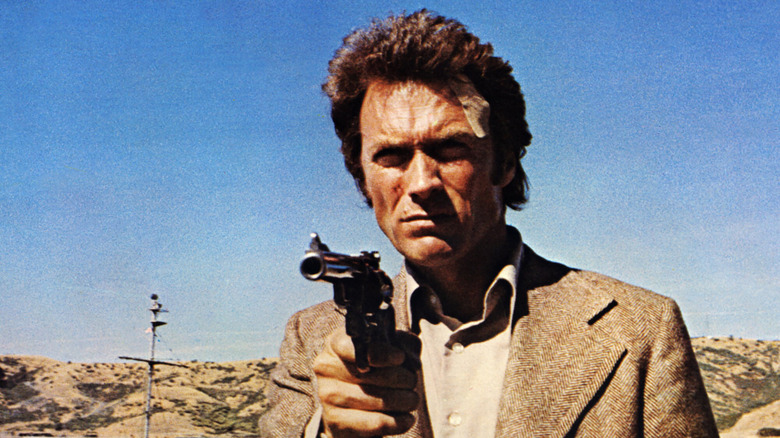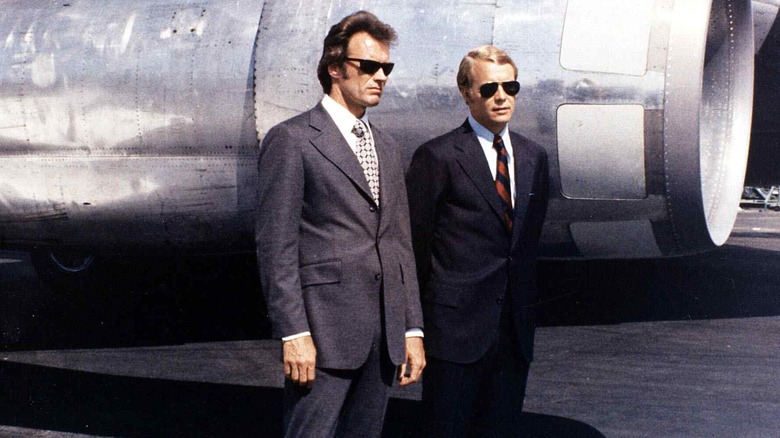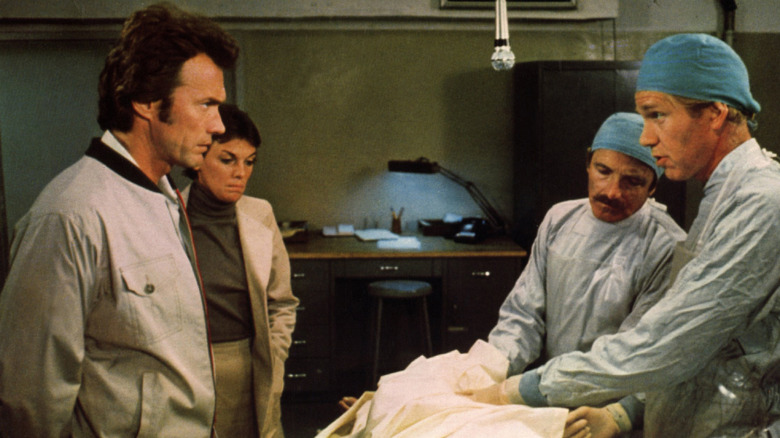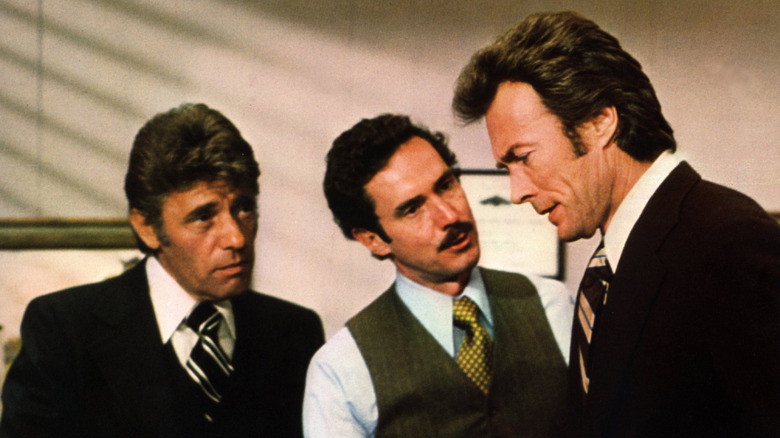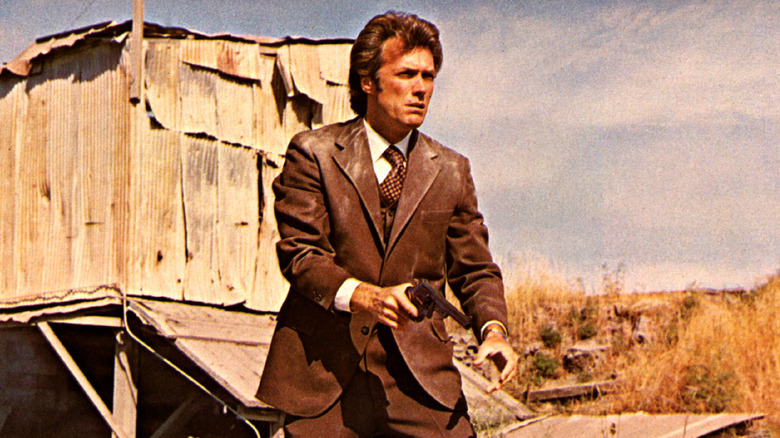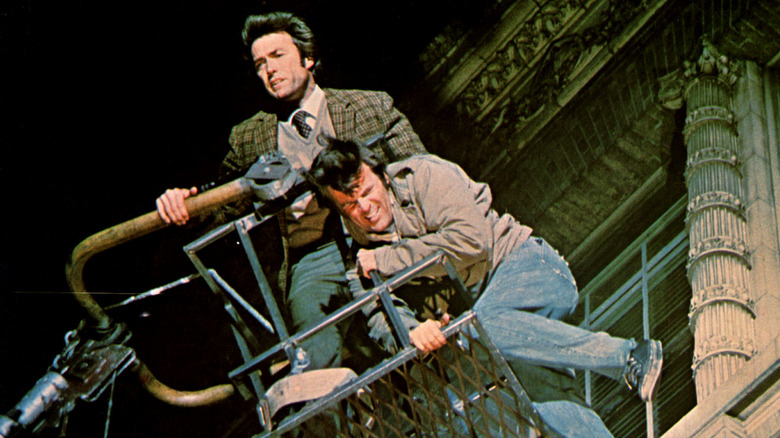Every Dirty Harry Movie Ranked Worst To Best
You don't want to find yourself at the other end of Dirty Harry's .44 Magnum, especially if he's lost count of how many shots have already been fired. As played by Clint Eastwood in a series of five films released between 1971 and 1988, "Dirty" Harry Callahan was the ultimate vigilante cop, a San Francisco police detective unafraid of bending (or even breaking) the rules to catch the bad guys.
It's fair to say that Harry's brand of justice isn't exactly the kind we should be administering. Yet it's perhaps unfair to accuse the films (or the character himself) of advocating for full-on vigilantism. Sure, the car chases and shootouts are thrilling to watch, but the series is also more insightful about the true nature of law and order than it's often given credit for.
So how do the films hold up, especially when viewed through a modern lens? Here's a look back at all the movies in the "Dirty Harry" series, ranked in order from worst to best. (If you haven't seen all of these titles, beware of SPOILERS!)
5. The Dead Pool (1988)
By the time he made "The Dead Pool," Eastwood was clearly ready to leave Dirty Harry behind (the same year this film was released, Eastwood won the Golden Globe for directing his Charlie Parker biopic "Bird"). The series was starting to feel a little long in the tooth, as new action franchises like "Lethal Weapon" and "Beverly Hills Cop" started to rise in popularity. So it's little wonder the fifth entry was Harry's last stand.
At 91 minutes, it's the shortest film in the bunch, with just enough plot to justify its brisk runtime. The premise: a psycho is killing San Francisco celebrities based on a "dead pool" game that predicts who'll die next. Harry is surprised to find himself on that list after his newfound notoriety from testifying against a local mob boss.
The first to die is drug-addicted rock star Johnny Squares (a young Jim Carrey, billed as James Carrey), who seemingly overdoses while shooting a music video. The director, Peter Swan (Liam Neeson), is a horror movie maestro with a big ego and a short temper. As more bodies pile up in gruesome ways that mirror his films, Swan finds himself a target of the investigation. But Harry thinks this is the work of an imposter trying to frame the director, and the list of suspects is endless considering how many enemies Swan has made.
Meanwhile, Harry's disdain for the press is softened when he meets Samantha Walker (Patricia Clarkson), an intrepid reporter who will stop at nothing to get a story. When they meet, Harry smashes her camera because she won't leave Johnny Squares' grieving girlfriend alone. Before you know it, they're enjoying a romantic dinner that's rudely interrupted by gunmen.
Sending Dirty Harry off into retirement
Harry also finally gets a partner who doesn't die in the end (although, SPOILER ALERT, he is a little banged up in the third act). Evan C. Kim plays Inspector Al Quan, whose kung fu skills come in handy when the two try to stop a robbery at a restaurant in Chinatown.
If nothing else, the film deserves special credit for one of the most creative car chases in movie history, as Harry and Al have to evade a remote-controlled toy racer armed with explosives. There's something kind of fun about watching a tiny vehicle fly over those famous San Francisco hills while chasing a full-sized squad car.
Critics were overall cool on this final entry (although Roger Ebert did award it three and a half out of four stars, calling it "as good as the original"). But at least we can take comfort watching Harry get something of a happy ending, since he saves Samantha from the clutches of the real bad guy by impaling him with a harpoon. As the two walk away from the crime scene, you can almost feel Eastwood sending his signature character off into retirement.
Of special note: this is the only entry in the series to not feature an appearance by Albert Popwell, who played four different characters in the other four films.
4. Sudden Impact (1983)
If nothing else, "Sudden Impact" deserves special mention for providing us with one of the two most famous quotes in the franchise's history (and according to the AFI's list, the 6th most memorable line in movie history). It comes when Harry finds himself in the midst of a robbery at his favorite diner (he's tipped off by the waitress, who puts too much sugar in his usual black coffee). After three of the robbers are gunned down, a fourth takes a hostage, only to find himself on the wrong end of Harry's .44 Magnum. Harry stares the thug down and memorably says, "Go ahead, make my day." In the interest of self-preservation, the criminal chooses not to.
It's also notable for being the only film in the series that Eastwood also directed. One can only wonder why he chose to pull double duty on the fourth "Dirty Harry" installment, but you can see his directorial fingerprints nonetheless. "Sudden Impact" features the shadowy aesthetic that would come to define Eastwood as a filmmaker, setting it apart visually from other entries in the series (the original "Dirty Harry" aside).
The plot transplants Harry from San Francisco to San Paulo to investigate a string of murders that have one thing in common: they're all men who were shot first in the genitals, then in the head. Frighteningly specific, huh? Harry thinks so too, although the local police chief (Pat Hingle) doesn't want him digging around too much, seeing as how everywhere he goes, chaos ensues. (He's got a point: on his first day in the new town, Harry runs down a robber after commandeering a bus filled with senior citizens on a day trip from their retirement home.)
Upon arriving at his hotel room, he's greeted by a pint-sized bulldog named Meathead, continuing the Eastwood-plus-animal sidekick universe started by "Every Which Way But Loose" and "Any Which Way You Can" (although Meathead the dog has decidedly less to do here than Clyde the orangutan did in those two films).
A sequel that proved Dirty Harry still had some grit
The killings are being carried out by Jennifer Spencer (played by Eastwood's then-girlfriend, Sondra Locke), who, along with her sister, Beth, was raped by a group of men egged on by the licentious Ray Parkins (Audrie J. Neenan). Ten years later, she's returned to the scene of the crime to carry out her revenge.
Just like in "Magnum Force," Harry is confronted by someone taking the law into their own hands — the very thing he was accused of doing in the first film. This time, however, there's a romance that sparks between the cop and the criminal, as Harry has as close to a meet-cute as he possibly can with Jennifer while investigating the murders (he accidentally knocks her off a bicycle while running with Meathead). Like "The Enforcer," this relationship hints at a certain tenderness beneath Harry's granite exterior.
It certainly helps that Jennifer doesn't turn out to be the real villain. That would be Mick (Paul Drake), one of the sneering rapists who assaulted Jennifer and her sister. The movie ends with Mick and his minions terrorizing Jennifer at the boardwalk where the original crime was committed. Good thing Harry shows up with his brand new .44 AutoMag to save the day.
Roger Ebert praised "Sudden Impact" as "a Dirty Harry movie with only the good parts left in." That includes moments when Harry induces a mob boss (Michael V. Gazzo of "The Godfather Part II") to have a heart attack at his daughter's wedding and takes down some thugs who try to blow up his car with Molotov cocktails. Though other critics were less generous, this fourth outing proved Dirty Harry still had a lot of grit left in him.
3. Magnum Force (1973)
Success demands repetition in Hollywood, so it was inevitable that Dirty Harry Callahan would return for another adventure following the massive box office performance of his debut. The first of four sequels, "Magnum Force" seeks to address some of the criticisms of the original "Dirty Harry," showing the limits of its hero's vigilantism. But make no mistake: he's just as dirty as ever.
Directed by Ted Post from a script by New Hollywood stalwarts John Milius and Michael Cimino (with early contributions by Terrence Malick!), the film finds Harry investigating the murders of several high-profile San Francisco criminals. This includes an acquitted mob boss (Richard Devon), a drug kingpin (Clifford A. Pellow), and a pimp (Albert Popwell).
Harry finds nothing wrong with killing criminals in principle, of course, but in practice it's problematic. At first he suspects his former partner, the deeply disturbed Charlie McCoy (Mitchell Ryan), but he soon realizes the murders are being carried out by a rogue cadre of police cadets who are fed up with watching guilty people go free on legal technicalities. (The cast of killer cops includes newcomers Tim Matheson, Robert Urich, and David Soul.)
Showing audiences a new side of Dirty Harry
But wait, shouldn't Harry be on the same side as these guys? Not necessarily. As he says when the conspiracy becomes clear to him, he hates the system — "But until someone comes along with changes that make sense, I'll stick with it." This may seem in direct contradiction to the Harry who bends the rules when they don't suit him, but really it's in keeping with his moral compass: after all, everything he does is in service of protecting society from those who seek to destroy it, whether they carry a badge or not. In that way, "Magnum Force" is a surprisingly forward-thinking cop thriller.
The sequel is greatly enlivened by the casting of Hal Holbrook as Lt. Briggs, a by-the-books officer who opposes Harry's wild man tactics. He's especially wary of Harry's theory that the killings are being carried out by their own men. It should come as little surprise (SPOILER ALERT) that Briggs is actually in charge of the police death squad, which just goes to show you should never trust someone who follows the rules that closely.
While hunting down vigilantes, Harry somehow finds time to spark a romance with a downstairs neighbor (Adele Yoshioka), stop a drugstore robbery, and impersonate a pilot to disarm two airplane hijackers. He also gets a new partner (Felton Perry) who meets an untimely demise thanks to an exploding mailbox.
The film never quite meets the artistic heights of its predecessor (for all his workmanlike skill, Ted Post was no Don Siegel), and it was met with a decent if lukewarm critical reception. But "Magnum Force" does succeed in showing audiences a new side to Harry's character without sacrificing any of the bravura action set pieces and darkly funny wisecracks that made the first entry such an audience favorite.
2. The Enforcer (1976)
"The Enforcer" might not have the airtight plotting or memorable villains of the first two installments, but what it does have is a central relationship that reveals surprising nuances in Harry's character. As such, Eastwood gets a chance to stretch his acting muscles and play some different notes from his usual macho persona (he doesn't stretch too much; this is still a "Dirty Harry" movie, after all).
In the franchise's third entry, Harry finally gets a partner who manages to break through his rock-solid shell, and it's not who you'd think it would be. Tyne Daly co-stars as Kate Moore, a young cadet turned detective thanks to new representation quotas at the department. (Daly won four Emmys for starring as a detective on "Cagney & Lacey," so think of this as a dry run for her most iconic role.) It shouldn't surprise you to learn that Harry's views of women on the force aren't exactly modern, but they evolve as Kate continuously proves her mettle when the guns start blazing.
He meets her after being demoted to personnel duties following a liquor store holdup, during which he drives a car through the storefront and opens fire on the armed robbers to save the hostages. (Hey, they demanded a car and a radio, and Harry provided them with one.) Already angered by his new assignment, he's downright furious to learn the department is pushing to promote Kate despite her lack of field experience.
So you can imagine his ire when Kate is made his new partner. Harry hasn't exactly had good luck when it comes to working with others (as Kate points out, three of his previous partners have died), and he's not exactly keen on teaming up with a woman. But she gains his respect while investigating a terrorist organization that's stealing military grade weaponry from local warehouses.
Dirty Harry with an extra dose of heart
At first, the SFPD thinks this is the work of a black militant group, although Harry knows better, since he's already struck a deal with that group's leader, Mustapha (Albert Popwell), for information.
There's a surprising amount of tenderness that develops in the relationship between Harry and Kate, and Eastwood's performance in his scenes with Daly hints at the more sensitive side he'd reveal in films like "The Bridges of Madison County" and "Million Dollar Baby." Harry is still tough, but he's at least willing to allow someone into his life in a personal way.
Of course (SPOILER ALERT), Harry can't be partnered up with someone for too long, and Kate is gunned down while trying to rescue the mayor (John Crawford), who's been taken hostage on Alcatraz by the militant group. Harry avenges her death by blowing up the group's leader with one of their stolen bazookas (talk about excessive force). But that does little to heal the wound in his heart left by the death of his partner, who sacrificed her life to save his own. When the mayor sings his praises and promises a letter of commendation for his heroism, Harry simply walks away to be with Kate's dead body.
The militant group, made up of disaffected Vietnam veterans hoping to cause a stir, aren't nearly as interesting as the Scorpio Killer from the first film or the police militia from the second. But that deficit is more than made up by the unexpected friendship that develops between its two leads. Critics like Roger Ebert applauded this movie as being the best in the series "at striking a balance between the action and the humor," thanks in large part to Daly's performance as an officer who matches Harry in skill and determination but adds a welcome dose of heart.
1. Dirty Harry (1971)
The one that started it all is still the best of the bunch. The original "Dirty Harry" — much like the Oscar-winning "The French Connection" released the same year — presented a hero cop prone to acts of vigilantism when the law wasn't on his side. Although Harry was undoubtedly the good guy, he didn't always behave that way, especially when it came to apprehending and interrogating suspects. Simply put, this was no Sgt. Joe Friday of "Dragnet."
Harry's persona was solidified in the film's most famous scene, in which the San Francisco police detective casually takes down a band of bank robbers while eating his lunch. When one of the surviving criminals (Albert Popwell) reaches for his weapon, Harry aims his .44 Magnum at his head and says: "You've gotta ask yourself one question: 'Do I feel lucky?' Well, do you, punk?" (The AFI listed this as the 51st greatest movie quote of all time.)
The character was right in Eastwood's wheelhouse, having first shot to fame as the laconic cattle rustler on TV's "Rawhide" and as the mysterious gunslinger in Sergio Leone's "The Man with No Name" trilogy. "Dirty Harry" took his star persona and transplanted it to a contemporary setting, recreating an Old West mentality in a modern metropolis.
Directed by Don Siegel, the tough guy maestro who made art out of B-movies, the film finds Harry tracking down a psycho known only as the Scorpio Killer (chillingly played by Andy Robinson) who's terrorizing the city with his sniper rifle. He blackmails the police force, threatening to kill more people if he doesn't receive increasingly large amounts of ransom money. Things escalate when he starts killing and kidnapping children, and it's up to Harry to find him before a teenage girl dies.
Harry tracks the killer down at a sports arena, shoots him in the leg, and tortures him until he reveals the location of the kidnapped girl, who has already died. And that's where bureaucratic red tape starts to get in the way of the investigation. Since Harry violated the Bill of Rights, the Scorpio Killer is released, and he ends up hijacking a school bus in demand for a ransom. But Harry (SPOILER ALERT) isn't gonna let that happen, and after saving the kids, he shoots Scorpio in an abandoned quarry. The film ends with him throwing his badge in the water as a final middle finger to the police department.
The original and still the best
This, of course, was not met without criticism. Many critics at the time accused the film of promoting police brutality as a means to an end. Even reviewers like Roger Ebert, who praised it as an "effective" thriller, still condemned it for taking a "fascist" moral position. That didn't stop it from becoming a massive commercial success that spawned four sequels and countless imitators.
It's fair to take a second look at "Dirty Harry" through modern eyes. As our views on policing in America have evolved, so have our thoughts regarding how it should be portrayed in our media. Is Harry justified in shooting first and asking questions later, even when the film takes great pains to show the bad guys endangering innocent people? More importantly, are these films advocating for Harry's view that the Bill of Rights need not always apply to violent criminals? Certainly Eastwood's personal libertarian politics have caused the series to be re-examined.
If nothing else, it's an extremely effective product of its time, a moment in history when Hollywood — sparked by the Vietnam War and revolutions at home — sought to more accurately portray life as we knew it. Someone like Dirty Harry, a tough cop who wants to keep the streets safe no matter the cost, is directly in keeping with other morally ambiguous protagonists from the era.
"Dirty Harry" was a direct result of the New Hollywood revolution of the 1970s, when classic black-and-white virtues were cast aside for more ambivalent shades of gray. In this decade, the heroes were often as violent and reckless as the villains, and carrying a badge made no difference as to which side of the law you were on. Politics aside, it still holds up as one of the most effective police thrillers ever made, thanks to Eastwood's steely-eyed performance and Siegel's sturdy direction.
